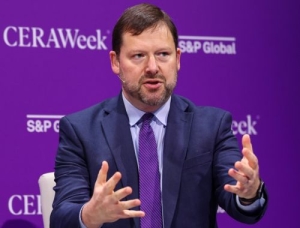
- About
- Education
- Research
- Thought Leadership
- Engagement
- News & Events
Back to Top Nav
Back to Top Nav
Back to Top Nav
Back to Top Nav
Back to Top Nav
In a panel discussion titled "Sparking Innovation through Policy" at CERAWeek, industry leaders Derek Walker, Executive Director of the Irving Institute; April Salas, Chief Operating Officer of the Energy Future Initiative Foundation; and Andy Brooks of the North Sea Transition Authority shared insights on the vital intersection of policy, innovation, and collaboration in the energy sector. Moderated by Roman Kramarchuk from S&P Global, the conversation addressed questions about how frameworks and policies could support the growth of early-stage technologies aimed at mitigating emissions. The panelists underscored the importance of building an ecosystem that connects government, private sector, and academia to accelerate the deployment of innovative solutions to pressing energy challenges.
April Salas emphasized the need for a collaborative approach that fosters a pipeline of projects to address critical issues in the energy landscape. She discussed the role of the Advanced Research Projects Agency-Energy (ARPA-E) in creating necessary support mechanisms to expedite innovation and market readiness. Salas cited the example of hydrogen hubs as a promising approach to testing market demand and assessing workforce capabilities before allocating taxpayer dollars. Her perspective highlighted the significance of thoughtful policy design that does not predetermine winners and losers but rather encourages an innovation ecosystem.

Derek Walker added that early-stage innovation flourishes in stable conditions, where new business models can emerge without chaos. He stressed that many current technologies have roots in earlier breakthroughs from decades past, such as enhanced geothermal which builds on hydraulic fracturing technology. Walker pointed to the catalytic role that the government can play in supporting early-stage entrepreneurs through policies that stimulate growth, reiterating the need for a diverse range of funding sources, especially given the volatility of federal support. He also pointed to the opportunities for collaboration between industry and academic institutions, using Dartmouth as an example of how such partnerships can enhance the value provided to society.
In discussing the Inflation Reduction Act (IRA) and its continuing influence on innovation, Salas expressed optimism regarding its provisions for reshoring manufacturing and accelerating technology deployment. She noted that both red and blue states are witnessing tangible benefits from the IRA, thus highlighting a shared opportunity to foster American energy leadership. Walker echoed this sentiment by observing how the Bipartisan Infrastructure Law (BIL) and the IRA are reshaping the political landscape, creating a common ground for collaboration across diverse regions and stakeholders. The panelists recognized that regionalization is crucial for aligning local efforts around core technologies, ultimately leading to enhanced clean energy deployment.
The discussion culminated with an exploration of global opportunities for innovation, particularly in developing economies. Salas pointed out that significant lessons could be learned from nontraditional markets, emphasizing the potential for joint ventures to navigate risk profiles and meet growing demands in the U.S. and beyond. As the panel closed, all participants agreed that by fostering a collaborative spirit and sharing risks, the energy sector can unlock vast potentials that drive sustainable growth and innovation on a global scale.
CERAWeek is regarded as one of the most influential annual conferences in the energy sector, drawing nearly 10,000 executives, policymakers, investors, entrepreneurs, and scientists from around the globe. Attendees engaged in a week filled with hundreds of discussions, covering topics such as domestic energy production, the influence of AI on energy systems, the rapid deployment of solar energy, the evolving policy landscape, and pioneering carbon capture technologies.
The Irving Institute brought 25 delegates who actively networked with industry leaders and exchanged ideas. Our faculty, staff, and affiliated startups delivered over two dozen presentations throughout the week.